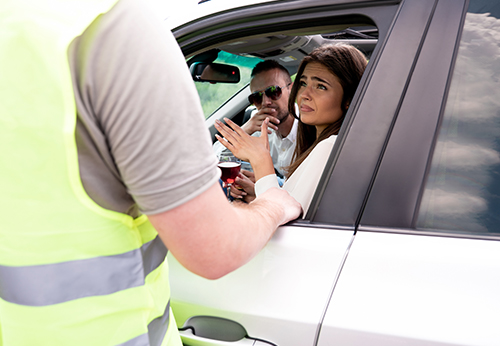Your Legal Defenses To Drugged Driving Charges In New Jersey
 What Are the Best Legal Defenses Specific To Drugged Driving Cases In New Jersey?
What Are the Best Legal Defenses Specific To Drugged Driving Cases In New Jersey?
To defend a drugged-driving case in New Jersey, start with an examination of the elements of a DWI/ DUI drunk driving offense.
How Do You Challenge “Intent To Move The Vehicle”?
In New Jersey, DUI is defined as operating a motor vehicle while under the influence of alcohol, narcotics, hallucinogens, or other impairing drugs.
The first element we must deal with is operation of a motor vehicle. Operation does not just include driving. It includes controlling the vehicle or exhibiting any attempt to move that vehicle.
For example, a person may be charged with DUI for sleeping in their car while drunk with the engine turned on to keep them warm. In these cases where a person may not be actively driving drunk, but they are found in a running vehicle while under the influence, it’s up to the judge to decide. If the judge determines there was no intent to move the vehicle, you can defeat a DWI charge based on the absence of proof about the operation of the vehicle.
How Do You Challenge “Probable Cause”?
The police must establish a reasonable basis for stopping a car and probable cause to arrest a person for DUI. They do this by asking questions about whether you had anything to drink and making general observations of how your eyes look, hands move, and speech sounds.
The police will also usually administer standardized field sobriety testing, which involves “horizontal gaze nystagmus [“HGN”], walk-and-turn, and one-leg-stand tests. For the HGN test, the officer moves a finger or pen across your field of vision and asks you to follow that stimulus with only your eyes while keeping your head still to see if your eyes jerk back and forth. Next, the officer will have you stand heel to toe and then walk in a straight-line going heel to toe with your hands at your sides. The officer looks to see how you follows directions—i.e., whether you start the test before being told to begin, whether you step out of the heel-to-toe stance; whether you walk in a straight line; whether you step off the line, fail to touch heel to toe, pause to balance yourself, raise your arms, or turn other than as instructed. Finally, they’ll have you stand on one leg to see whether you raise your arms, sway, hop, or drop your foot. Of course, these are all things that anybody would do to compensate for the imbalance induced by such abnormal ways of standing and walking. The police officer’s theory is that any deviation from perfection and any sign of impairment must be due to alcohol or drugs.
At trial, the State will use this same evidence with which it establishes probable cause to attempt to convince the judge that you were under the influence. But impairment can be caused by things that have nothing to do with alcohol or drugs. These can be things like being nervous, tired, or distracted, suffering from an old injury or condition that prevents you from standing or being able to walk, or simply being a klutz or out of shape.
Remember that the walking and standing tests need a person to reduce the area over which they would usually distribute their weight, which will cause imbalance. In the case of the one-leg stand, officers further compromise balance by having you raise your center of gravity by lifting your leg. Police manuals talk about how people over the age of 65 and people who are overweight by more than 50 pounds shouldn’t be expected to perform these tests. Unfortunately, the limitations about age and weight are somewhat arbitrary since there’s no real science to back up these claims. The bottom line is that these factors can apply to anyone at almost any age.
Since most DUI stops occur at night, tiredness is often a factor for most people. Besides, the stress and nervousness of interacting with a uniformed police officer late at night can impair the person’s ability to do the tests without error. After all, police officers have a gun, and they are used to having tasks or interactions with others at a late hour. All the officer needs to justify the arrest is something they can describe in their report.
Keep in mind, probable cause is just the reasonable basis on which to arrest someone for the purpose of continuing the investigation. This preliminary question about probable cause is not about guilt or innocence; it’s about whether the state is legally allowed to use the evidence they have against you in court.
How Do You Challenge A Breathalyzer Test?
Some defenses focus on the breath test result. This is because the state must prove that the instrumentation they used was approved and in proper working condition. They must also prove that the test was conducted properly and that the person performing it was certified.
Now, most of these conditions can be satisfied through documentation which we’re entitled to get in that pretrial phase called “discovery.” Discovery is the legal term for getting copies of police reports, videos, audio recordings, and other evidence.
Once we review the discovery, we have a better idea of how the State will try to prove that the instrumentation was working correctly, the officer giving the test was properly certified, and the officer conducted the test properly. The state will need some testimony about whether the testing followed approved procedures. For example, officers must testify that their radios or other sources of electronic interference were outside the testing area, that they changed mouthpieces before taking each sample, and that they checked your mouth and continuously observe you to ensure no regurgitation, belching, or ingestion for at least 20 minutes before you blow into the instrument.
Video is critical because, while police officers may believe they’ve satisfied these conditions, lapses often occur, and those lapses can lead to the exclusion of the breath test result.
Remember! It’s all about testimony. One reason we go to trial is because we never know what that testimony will be until it happens. If there’s no downside risk to what may happen to you after the trial versus what will happen if they plead guilty up front, we’ll often go to trial.
With the guidance of a skilled attorney for DUI Law In New Jersey, you can have the peace of mind that comes with knowing that we’ll make it look easy.
An initial consultation is your next best step for more information on the Use Of Drug Tests In Drugged Driving Cases In NJ. Get the information and legal answers you seek by calling (732) 218-9090.

